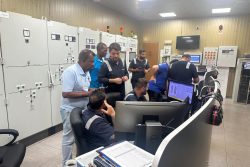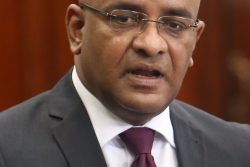Dear Editor,
Thank you for publishing my letter on Guyana’s explosive growth and the impatience, or high rate of time preference, that seems to attend our quest to address various “development gaps.” (For those who are familiar with these things, Guyana’s per capita GDP would have doubled from US$6k in 2016 to US$12K in 18 (and not 23, as was stated in my letter) years if our growth rate remained at 4%; but our per capita GDP now exceeds US$20,000 after just seven years!). Led from the top, everyone now has a high rate of time preference; but some people are being told to be patient, while benefits are being front loaded for others.
Recently, I was asked a rather brilliant question: How would I evaluate the choices we are making about the use of our new oil wealth. If I were asked this question again, I’d point out that the most important thing about our choice is that we have to choose. It is important to note that we (Guyana) still must choose, despite our oil wealth. That implies simply that we cannot have everything that we want, that there are trade-offs and opportunity costs to whatever we choose to do. We must therefore use our oil wealth wisely, opting for those things that will yield the longer-term returns from sustainable, inclusive and equitable growth even after our oil wealth comes to an end.
But secondly, and maybe even more importantly, the choice of what to do with our oil wealth is being made by the government, and not by private citizens or even by the market. The likelihood that the government gets it wrong is not insig-nificant. And quite apart from the fact that wrong decisions can be very costly is the fact that in Guyana, it’s difficult to ever hold a government accountable for its actions given the nature of our politics.
The fact that it is the government that is making the choices and decisions about what we do with our oil wealth also points to a deeper concern – the distortion of choice, the implied dirigisme that seeks to choose for us the things that are good for us. Angst is building up in Guyana, and this could boil over into conflict, as indeed is happening with the ongoing teachers’ strike that the government deems as illegal.
Whether illegal or not, the strike brings into sharp relief the contradictions that exist in Guyana, with the government choosing to undertake a number of mega-projects whose potential benefits to everyone-at-large will only be indirect and short-term if these mega-projects are actually successful; while the teachers are seeking more direct benefits that could also redound to a more sustainable, inclusive and equitable economic and social transformation that is based on addressing our human capital deficiencies.
Far more important than the salary increases that are being sought by the GTU and its members however, is the way the strike is being handled, because the strike is really about the conflicting choices that we as a society must make. The real question is whether the choices being made for us by the government would enhance our freedom and agency in both the short run and the long run. It is about whether we can have a say in the future that we would like for ourselves in Guyana.
Speaking for myself (and speaking a bit like Amartya Sen, I believe) I would prefer to have a greater opportunity to make more choices for myself.
Yours faithfully,
Thomas B. Singh





